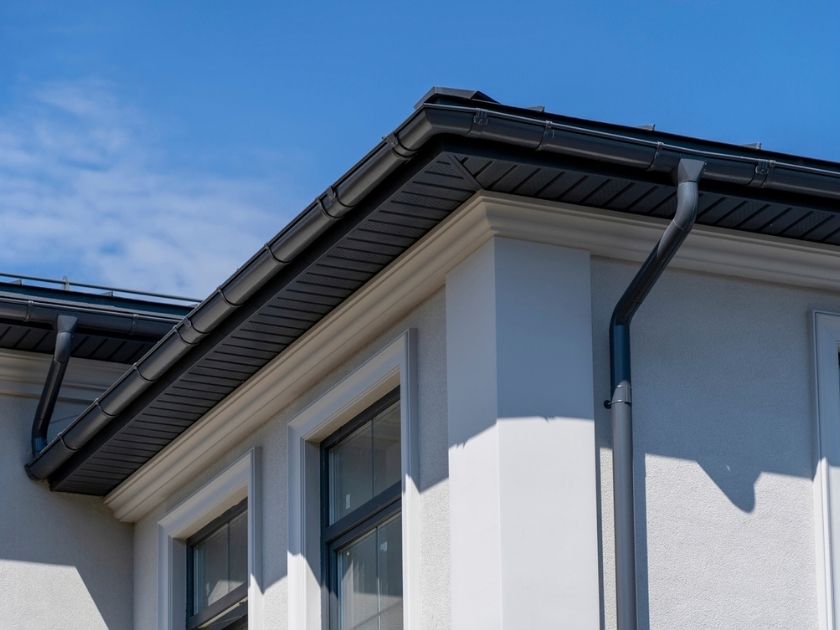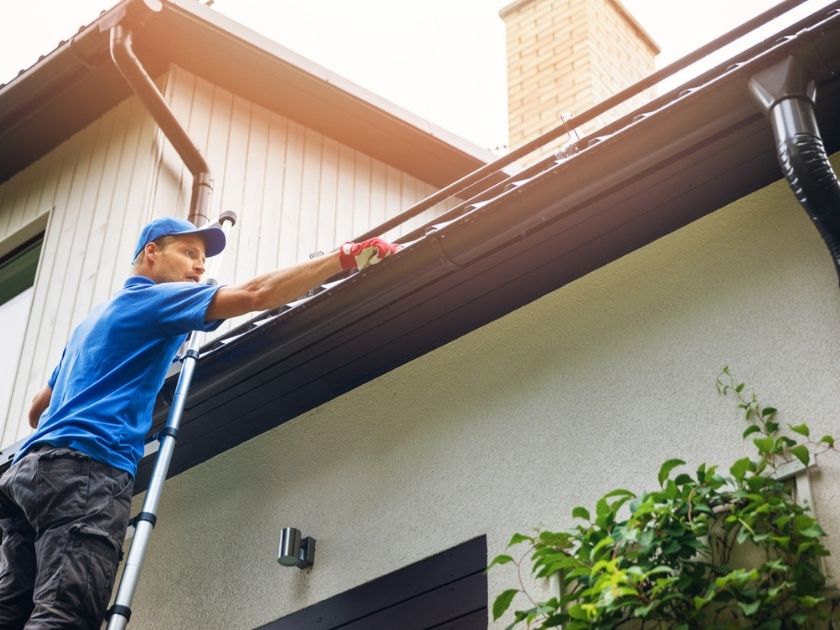When it rains, gutters divert water from the roof and the rest of your house. They are essential to preventing costly home exterior issues, basement flooding and foundation damage. Regular cleaning is vital for them to remain efficient and last long. To make maintenance more effortless, consider investing in a high-quality gutter protection system.

Read on to learn why your choice of gutter guards and contractor to install them matters.
Common Types of Gutter Protection Systems

Foam Gutter Guards
While foam gutter guards are inexpensive, they are not a permanent fix for gutter clogs. The foam allows water to pass through while keeping debris out of the gutters. However, the material can retain moisture that encourages mold or plant growth. Daily exposure to the elements also causes it to fail shortly.
Mesh Gutter Guards
You can usually get mesh gutter guards in metal and plastic variations. They feature small holes that can filter tiny debris. Avoid mesh gutter guards that slide beneath shingles because they can void your roofing warranty. They can also get blown off during storms or high winds.
Micro-Mesh Gutter Guards
Micro-mesh gutter guards can catch tiny debris due to their finely woven mesh screens. Their downside is that they can potentially restrict water flow.
Screen Gutter Guards
Screen gutter guards are installed on top of the gutters. They have larger holes, making them ineffective at blocking smaller debris like dirt and pine needles. This option is typically lightweight, meaning it is unsuitable for areas prone to weather extremes.
Brush Gutter Guards
Unlike other types of gutter protection, brush gutter guards don’t eliminate debris from gutters. When rainwater flows through the gutters, the bristles catch the debris. You’ll have to frequently remove and clean the brush to avoid clogs. Brush gutter guards also don’t stand well against the sun’s harmful UV rays.

Reverse-Curve or Surface-Tension Gutter Guards
Also called surface-tension guards, reverse-curve gutter guards are known for effectively keeping debris out of your gutters. They have a hood with a curved edge, forming a small space between the gutter covers and gutter lip. Water enters through this gap, while debris passes over the lip and falls to the ground.
At Barry Best Seamless Gutters, we install high-quality gutter protection systems from Gutter Helmet®. They are designed to allow rainwater into your gutters while holding the debris out. With Gutter Helmet, constant cleaning is the least of your concerns. It’s a lightweight but highly durable aluminum made to withstand harsh rains, heavy snow and high winds. You can count on it to stay on your roof even during severe storms due to its heavy-duty reinforced aluminum alloy brackets.
Why Your Choice of Gutter Guards Matters

Prevent Clogging
Clogged gutters will cause water to back up to the roof and overflow into your siding, windows, doors and other exterior components. Excessive exposure to moisture can increase the likelihood of rot and mold growth. You want to invest in a gutter protection system that will prevent leaves, branches, seeds and other debris from entering and clogging your gutters. If you live in an area where storms are common, choose gutter guards made from durable materials like Gutter Helmet systems.
Reduced Cleaning
With the right gutter protection system, you won’t need to worry about frequent gutter maintenance. It means you can spend your time on more productive and enjoyable things. You will also enjoy more savings on maintenance costs. Even if you have gutter guards, you will still need to have your gutters inspected and cleaned at least once a year. It’s to ensure the system stays efficient and clog-free.

Keep Pests Away
Besides debris, gutter guards help deter pests from creating nests in your home or accessing your living space. Neglected or clogged gutters can also become the ideal breeding ground for insects like mosquitoes. Debris can hold moisture that mosquitoes can use to lay eggs and multiply fast. You don’t want to wait for an infestation before paying attention to your gutters.
Fire Protection
Another great thing about gutter guards is that they can strengthen your home’s defense against fires. Homeowners living in places prone to wildfires will benefit from this additional protection. Gutter covers made from metals are less likely to combust than plastic options. They filter out debris that can dry and ignite during fires.
Key Things to Consider
Cost is not the only thing you should consider when selecting gutter guards. You want to choose low-maintenance and durable products suitable for your local climate. It will help to weigh the pros and cons of your options.
For instance, while foam gutter guards cost less, they don’t last long and are susceptible to organic growth. On the other hand, aluminum gutter guards from Gutter Helmet feature a ribbed surface, letting them remain efficient even in the harshest conditions. They also come with PermaLife™ finish, a high-performance paint that withstands fading, chalking and corrosion. You can get it in a wide range of hues that will complement your home’s style.
Why Hire Professionals to Install Your New Gutter Guards?

Working with an experienced gutter contractor is crucial to the efficiency and longevity of your gutter protection system. It can be tempting to try to do the installation yourself since it seems like a simple task. However, doing so will put your safety at risk. Poor craftsmanship is also one of the most common reasons for early gutter guard failure.
Local professionals know which type of gutter protection works best for your area. They will carefully install the gutter guards to ensure excellent performance. Skilled contractors have the experience, training and skills for a seamless installation and quality results. You can also expect them to offer comprehensive warranties to back their work and products.
Before hiring a contractor, be sure to do your research and ask for proof of licensing and insurance. It will help to request references and read reviews. Fortunately, many companies have websites where they post pictures of their previous projects. You can also find client feedback online or check your prospective installer’s status with the Better Business Bureau (BBB).





